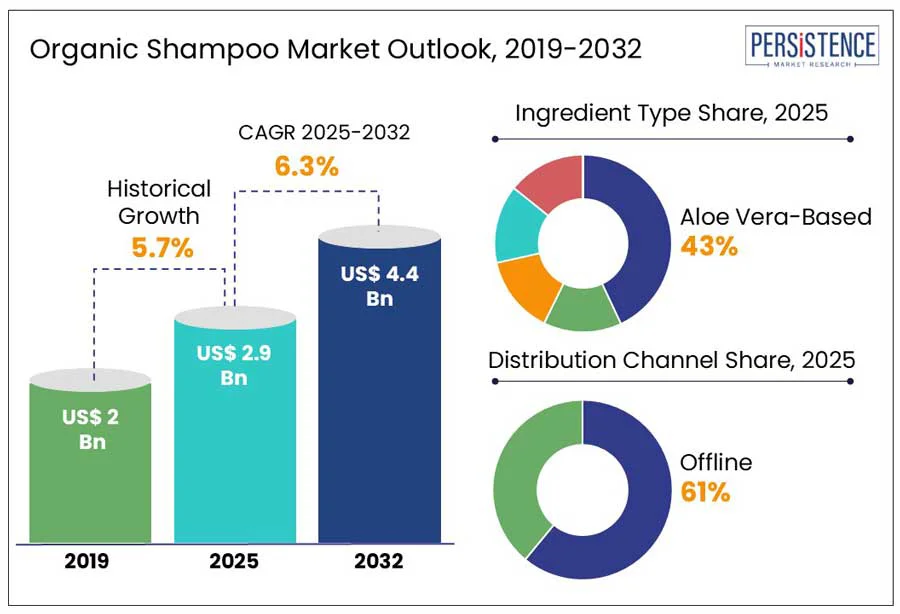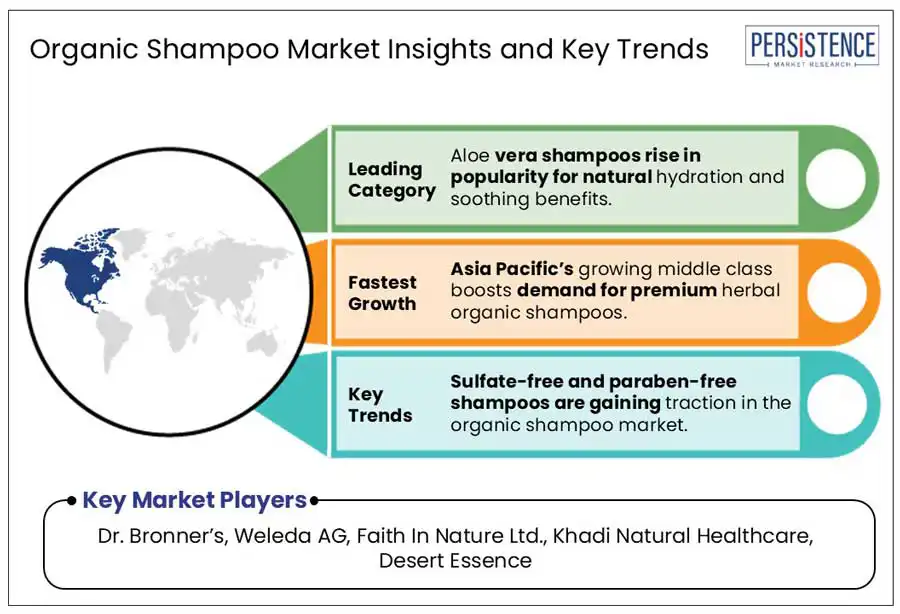ID: PMRREP35358| 200 Pages | 29 May 2025 | Format: PDF, Excel, PPT* | Consumer Goods

The global organic shampoo market size is anticipated to rise from US$ 2.9 Bn in 2025 to US$ 4.4 Bn by 2032. It is projected to witness a CAGR of 6.3% from 2025 to 2032. According to the Persistence Market Research report, the industry is gaining traction as consumers increasingly seek natural, chemical-free hair care solutions. Driven by growing awareness of ingredient transparency and sustainability, this market is evolving with innovative formulations and diverse product offerings. Organic shampoos are becoming a preferred choice worldwide as clean beauty trends rise.

|
Global Market Attribute |
Key Insights |
|
Organic Shampoo Market Size (2025E) |
US$ 2.9 Bn |
|
Market Value Forecast (2032F) |
US$ 4.4 Bn |
|
Projected Growth (CAGR 2025 to 2032) |
6.3% |
|
Historical Market Growth (CAGR 2019 to 2024) |
5.7% |
As awareness about the harmful effects of synthetic chemicals in conventional shampoos continues to rise, more consumers are making the shift toward organic alternatives. Organic shampoos, formulated with natural ingredients such as aloe vera, coconut oil, and tea tree oil, are increasingly seen as safer for both the scalp and hair. These ingredients not only nourish and protect but are also gentle, making them ideal for sensitive skin. Additionally, organic shampoos align with the growing wellness movement and the demand for eco-friendly and sustainable beauty products. With a focus on ethical production, these products are attracting health-conscious consumers globally, fueling market growth.
In February 2024, Beyoncé launched Cécred, a hair care line featuring eight products enriched with ingredients like butters, oils, honey, and fermented rice water. Designed for all hair types, the collection aims to nourish, cleanse, and repair hair, reflecting Beyoncé's commitment to inclusive beauty.
In October 2024, Nutrafol launched the Men's Active Cleanse, a 2-in-1 shampoo and conditioner targeting scalp health and hair thinning. Formulated with natural ingredients, it addresses common scalp concerns like dryness and flakiness, offering a holistic approach to men's hair care.
Organic shampoos, formulated with natural ingredients and free from synthetic preservatives, typically have a shorter shelf life than conventional products. This limited longevity can lead to reduced availability and hesitancy among retailers and consumers concerned about product expiration. Moreover, ensuring authenticity in organic formulations requires certified raw materials, sustainable harvesting practices, and eco-friendly packaging—all of which drive up production costs. These added expenses are often passed on to consumers, making organic shampoos significantly pricier than traditional options. For budget-conscious buyers or those in emerging markets, the higher cost becomes a barrier to adoption, restricting widespread market penetration despite growing interest.
As consumers become more aware of their unique hair care needs, the demand for personalized solutions continues to grow. Brands that offer specialized organic shampoos, such as those designed for anti-dandruff treatment, volumizing effects, moisturizing, or color protection, are well-positioned to attract a wider and more loyal customer base. These tailored products not only cater to individual concerns but also align with the increasing preference for natural, chemical-free formulations that are gentle on hair and scalp. Furthermore, by tapping into these niche segments, companies can enhance brand recognition, create deeper customer engagement, and solidify their competitive advantage in the evolving global organic shampoo market.
Amika launched its Big Hit Volumizing Shampoo, a vegan and cruelty-free formula enriched with sea buckthorn oil. Designed to boost volume and add shine, the shampoo caters to consumers seeking clean, natural hair care solutions. It's ideal for fine or limp hair needing body without harsh chemicals.
Detoxie launched its Flake Relief Capsicum & Anti-Dandruff Shampoo, a natural formulation enriched with capsicum, curry leaf, fenugreek, wheat germ, soy proteins, and vegetable keratin. Designed to combat dandruff and flakiness, this unisex shampoo is suitable for all hair types and is free from sulfates and parabens. It offers a clean, non-itchy scalp while promoting healthier hair.
Aloe Vera-based shampoos have gained significant traction in the organic shampoo market due to their natural hydrating and soothing qualities. Consumers increasingly prefer gentle, plant-derived ingredients that nourish both the scalp and hair without causing irritation or dryness. Aloe Vera is rich in vitamins, minerals, and enzymes that help maintain scalp health, reduce inflammation, and promote hair growth. Its natural cooling and moisturizing properties make it ideal for addressing issues such as dryness, itchiness, and dandruff. As health-conscious buyers move away from harsh chemicals, Aloe Vera-based shampoos have become a trusted choice for safe, effective, and eco-friendly hair care.
Avalon Organics introduced this shampoo, blending Aloe Vera with biotin, saw palmetto, and vitamin E to promote hair thickness and reduce shedding. Its natural formulation caters to those seeking organic solutions for hair thinning.
Rivona Naturals launched this shampoo combining 99% pure Aloe Vera extract with neem, avocado oil, moringa oil, and apple cider vinegar. Designed to hydrate the scalp, reduce dandruff, and promote healthy hair growth, it aligns with the clean beauty movement.
Women represent the largest consumer segment in the global organic shampoo market, primarily due to their heightened awareness of hair health, beauty standards, and the potential risks associated with synthetic hair care products. They are more likely to seek out gentle, natural alternatives that nourish the scalp and hair while avoiding harsh chemicals like sulfates and parabens. With increased access to information through digital platforms and beauty influencers promoting organic lifestyles, women are actively switching to eco-friendly, ingredient-conscious options. This shift is particularly strong in urban areas, where wellness and sustainable beauty trends are reshaping personal care preferences and purchasing decisions.

In North America, the organic shampoo market is experiencing robust growth, driven by increasing consumer awareness of the harmful effects of synthetic chemicals. A shift towards clean beauty and sustainable products has prompted consumers to seek natural hair care solutions. North American consumers prioritize eco-friendly packaging, cruelty-free certifications, and ingredient transparency. The trend is especially prominent among millennials and Gen Z, who are heavily influenced by social media and online reviews. Retailers are responding by expanding their organic product offerings, both online and in-store, to meet the demand for environmentally conscious and health-focused personal care products.
In early 2025, Eva NYC relaunched its hair care line with updated packaging using a minimum of 50% post-consumer recycled plastic, reducing greenhouse gas emissions by about 30%. The new Repair Ritual Strength Collection features bond technology and responsibly sourced ingredients like red algae from Japan.
Blake Lively's Blake Brown Hair-Care Brand offers eight products, including shampoos and conditioners, formulated with clean, vegan, and cruelty-free ingredients. The products are designed to deliver salon-quality performance at an affordable price and are available at Target.
In Europe, there is a growing interest in vegan and cruelty-free organic shampoos, driven by the region's strong commitment to ethical consumerism. Consumers are increasingly aware of the environmental and social implications of their purchasing decisions, leading to a surge in demand for hair care products that are both natural and cruelty-free. Many European brands are capitalizing on this trend by offering vegan shampoos made from sustainably sourced ingredients, free from animal testing. This shift aligns with broader sustainability movements in the region, where consumers prioritize products that are eco-friendly, ethically produced, and aligned with their values of social responsibility.
In October 2024, The Powder Shampoo launched the ECO Escapade Sets in the UK, featuring vegan, cruelty-free powder-to-foam shampoo and body wash products. These travel-friendly sets are formulated with 37 botanical ingredients and 9 essential oils, and are packaged without plastic, aligning with Europe's ethical consumerism trends.
In Asia Pacific, the growing middle-class population is fueling demand for premium organic shampoos, particularly those made with herbal ingredients. As disposable incomes rise, consumers are becoming more discerning about the products they use, with a noticeable shift towards natural and chemical-free alternatives. Herbal ingredients, such as ginseng, neem, and green tea, are particularly popular due to their perceived health benefits and cultural significance in the region. Consumers in countries like India, China, and Japan are increasingly opting for organic shampoos that promise better scalp health, environmental sustainability, and alignment with their wellness-focused lifestyles, thus driving market growth.
Japanese beauty giant Kao revamped its Essential Basic hair care line, introducing new formulations enriched with honey and collagen. The updated range includes moisturizing and detangling products aimed at repairing damaged hair, reflecting the Asia Pacific market's preference for functional, nature-inspired hair care solutions.
Innersense Organic Beauty, a U.S.-based clean hair care brand, partnered with Mash Beauty Lab to enter the Japanese market. This collaboration introduces Innersense's award-winning organic products to luxury retail stores, salons, and spas across Asia.
The global organic shampoo market is highly competitive, with numerous players offering a wide range of formulations to cater to diverse hair types and consumer preferences. Brands compete by emphasizing natural ingredients, eco-friendly packaging, and certifications such as cruelty-free and vegan. Innovation in product development, including specialized variants like volumizing and anti-dandruff shampoos, plays a crucial role in gaining market share.
Distribution through online channels and presence on social media platforms further intensifies competition. Companies also invest in influencer marketing and product transparency to build trust and differentiate their offerings in a market increasingly driven by conscious and informed consumers.
The global organic shampoo market is projected to value at 2.9 bn in 2025.
The organic shampoo market is driven by growing consumer preference for chemical-free hair care products.
The organic shampoo market is poised to witness a CAGR of 6.3% between 2025 and 2032.
Expanding product offerings for specific hair types is the key market opportunity.
Major players in the organic shampoo market include Dr. Bronner’s, Weleda AG, Faith In Nature Ltd., Khadi Natural Healthcare, Desert Essence, and others.
|
Report Attribute |
Details |
|
Historical Data/Actuals |
2019 – 2024 |
|
Forecast Period |
2025 – 2032 |
|
Market Analysis Units |
Value: US$ Bn/Mn, Volume: As applicable |
|
Geographical Coverage |
|
|
Segmental Coverage |
|
|
Competitive Analysis |
|
|
Report Highlights |
|
|
Customization and Pricing |
Available upon request |
By Product Type
By Ingredient Type
By End-user
By Distribution Channel
By Region
Delivery Timelines
For more information on this report and its delivery timelines please get in touch with our sales team.
About Author